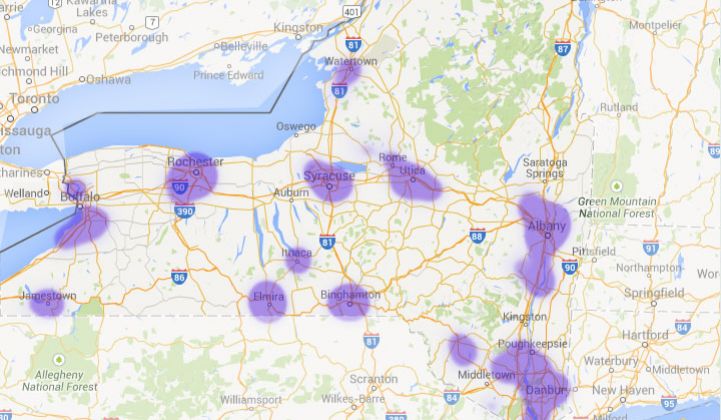Utilities aren’t always very forthcoming about their operational challenges. But in New York, sharing information about their pain points is just one step toward a new way of doing business.
The New York Prize community microgrid competition is a $40 million jumpstart for the state to build a market-based business for grids that support at least one critical facility, such as a hospital or fire station, and can operate independently in the case of emergency.
Run by the New York State Energy Research and Development Authority, the project just released the request for proposals for the first stage. It will award up to $100,000 for as many as 30 communities to study the feasibility of microgrids.
To get selected in the first stage, proposals will have to be in what NYSERDA is calling “opportunity zones,” which is a nice way of saying areas where there are system constraints on the distribution grid.
“[Utilities] understand the areas where they’ll be successful for these new systems will be where they have community buy-in and community support,” said Micah Kotch, director of NY Prize and strategic adviser for innovation at NYSERDA.
But it won’t be just utilities submitting proposals. NYSERDA does not specify who should own or operate the systems, so Kotch expects to see a mix of municipalities, private third parties, and hybrid ownership and operations models submitted.
“We’re going to let the market decide,” he said of which ownership model will ultimately rule the day.
The map shows the approximately 40 areas that the utilities identified as opportunity zones. While some utilities are upfront about their constraints, as Con Edison is in its proposal for batteries, microgrids and efficiency to defer a $1 billion substation, in other cases, “this is groundbreaking for them,” Kotch said of the information sharing.
The map just identifies critical infrastructure within the constrained zones now, but eventually it will include more information, such as the locations of distributed solar or combined heat and power installations. Eventually, even projects that aren’t involved in the prize could use the information. “The notion is then you’ll have the hot spots that the private sector can access,” said Kotch.
After the first stage, up to a dozen projects will be chosen to go through the next step, an audit-grade detailed engineering design and business plan assessment. Each awardee will receive up to $1,000,000 to do the work. The final step will be a full microgrid build-out for five to seven projects, which will split a total award of approximately $25 million. Cost sharing from communities is required for the second and third phases.
For the projects that make it through the first stage but not beyond, it might not be a dead end. Kotch said NYSERDA hopes the NY Prize will help unleash private-sector capital and identify viable projects that should be considered. “The approach we’re taking is not an all-or-nothing proposition,” he said.
For utilities, whether they want to own or operate the microgrid or are interested in managing microgrid assets in their territory, “it’s a great way to demonstrate some REV principles,” said Kotch, referring to New York’s Reforming the Energy Vision proposal, which calls for a future where distribution utilities are distribution platform providers that manage distributed assets.
“Reforming the Energy Vision's groundbreaking initiatives will fundamentally transform the way electricity is distributed and used in New York state,” New York’s chairman of energy policy and finance, Richard Kauffman, said in a statement. “By introducing and embracing information technology and clean energy solutions, such as microgrids, millions of New Yorkers will benefit from a 21st century power grid, enabling them to better manage and reduce their energy costs.”
One way that the NY Prize could help mobilize private-sector capital is to help the NY Green Bank, which Kauffman heads, to assess the opportunities for supporting qualified microgrid projects in the future using public-private partnerships. Kotch said those types of conversations are already happening.
Proposals for the first stage will be accepted through May 15.



